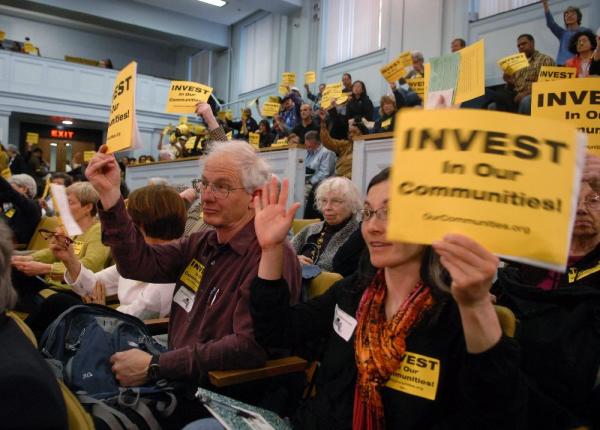So there they were, the usual suspects —
liberal legislators, liberal activists, liberal and/or greedy
public employee union leaders — some 800 silly-strong, at a
Revenue Committee hearing on Beacon Hill last week, supporting a
hike in the state income tax rate back to 5.95 percent.
Not that they called their proposal a "tax
hike" or even a "revenue hike." No, S.1416 is called "An Act to
Invest in Our Communities." The "investors" include groups that
call themselves "Yes!..." as in, "Yes!Raise taxes on people who
would rather invest their money elsewhere, especially those who
might invest it in creating jobs!" Along with the income-tax
rate increase, the bill increases the capital gains tax rate
from 5.3 percent to 8.95 percent.
Yes!Northampton member Sara Weinberger was
quoted in her local newspaper as saying she was not surprised
the measure faced little opposition at the May 5 hearing.
"I feel more strongly than ever about it,"
she said. "There are few arguments against doing this."
| |
 |
| |
Photo courtesy of The
Hampshire Gazette. |
No!That's not exactly correct, Sara. The
reason your $1.3 billion income tax hike bill faced "little
opposition" at the May 5 hearing is that it's ridiculous, and
normal people aren't taking it seriously enough to take them
away from their day jobs, if they still have one in this
recession.
However, Citizens for Limited Taxation
has seen similar silly proposals eventually cut into the income
we use for our own investments (i.e., paying bills, buying gas),
so CLT's Chip Faulkner was the "little opposition" noted
above.
He got there early to sign up first, and then
sat for two hours listening to testimony from, first, liberal
legislators, then all the liberal activists, unions and
Yes!groups. Eventually he called a point of order, demanding to
know why, despite his early sign-up, only one side was getting
heard at the hearing.
This query seemed to confuse presiding
officer Sen. Gale Canderas, D-Wilbraham, so she let him remind
the committee that voters had rolled back the income tax rate
from 5.95 percent to 5 percent in 2000. The Legislature stopped
the rolling "temporarily" at its present 5.3 percent in 2002 —
so really, it should be cut to 5 percent as voted, instead of
being hiked again.
There was another hearing scheduled this week
on the sales tax, which was also raised recently from 5 percent
to 6.25 percent. CLT supports returning it to its traditional 5
percent rate, but Faulkner will not be sitting through another
useless hearing. The liberals will point out that voters refused
to cut the rate to 3 percent when given the chance on last
year's ballot, so they must like it where it is. This is a
predictable response to voters' missing a chance to send a
message, even if they think a proposal "goes too far."
In fact, it's also predictable that
liberals/unions now reward the voters for their "reasonableness"
by demanding another tax increase. (It's the income tax's turn
this time. We can have another sales tax hike next year.
Remember: There's no upper limit until you reach 100 percent).
The theme of the "Invest in Our Communities"
hearing: "Get the rich" by creating a "more fair and progressive
tax system by asking the wealthy to pay more of their income
while increasing deductions for lower and middle-class
families," according to its sponsors. The personal deduction
would increase from $4,400 to $7,900, which effectively
graduates the rate structure.
The bill's sponsor, Rep. Jim O'Day, D-West
Boylston, explains: "It allows us the flexibility to make it
more progressive than making it a graduated income tax,
something that would require a change in the state's
constitution."
Only two things wrong with that part of the
plan:
A.) Something similar has been tried before,
to get around the voters' refusal (five times) to change the
Constitution to allow a graduated income tax. In 1986, the SJC
ruled that when your bill shows intent to "tax the same class of
income at different rates," you can't do it. And with his words,
sponsor O'Day shows that intent.
B.) In the past, when the personal exemption
was raised to make a rate increase more palatable, the personal
exemption was reduced again once the rate increase was safely in
place.
You can't trust liberals, and you really
can't trust the public employee union leaders. The Massachusetts
Teachers Association buses people to the hearing in an effort to
keep the union gravy train running; while AFL-CIO president
Bobby Haynes demands higher taxes from the engineer's seat on
that train.
The greedy geezers at the Mass. Senior Action
Council also supported the bill, which exempts them from the
capital gains tax increase.
However, while it's easy to dismiss the usual
suspects, we know that a tax increase which appears silly in May
often gets passed in July, if the state budget is still
unbalanced.
Sending written testimony in opposition, Sen.
Bruce Tarr, R-Gloucester, warned that "taxpayers shouldn't be
lulled into a false sense of complacency just because the House
passed a budget with no new taxes. The reality is that some
legislators are intent on pursuing every available avenue to
raise taxes."
So are a lot of liberals and public employee
unions. And in the past, they have usually gotten their way.